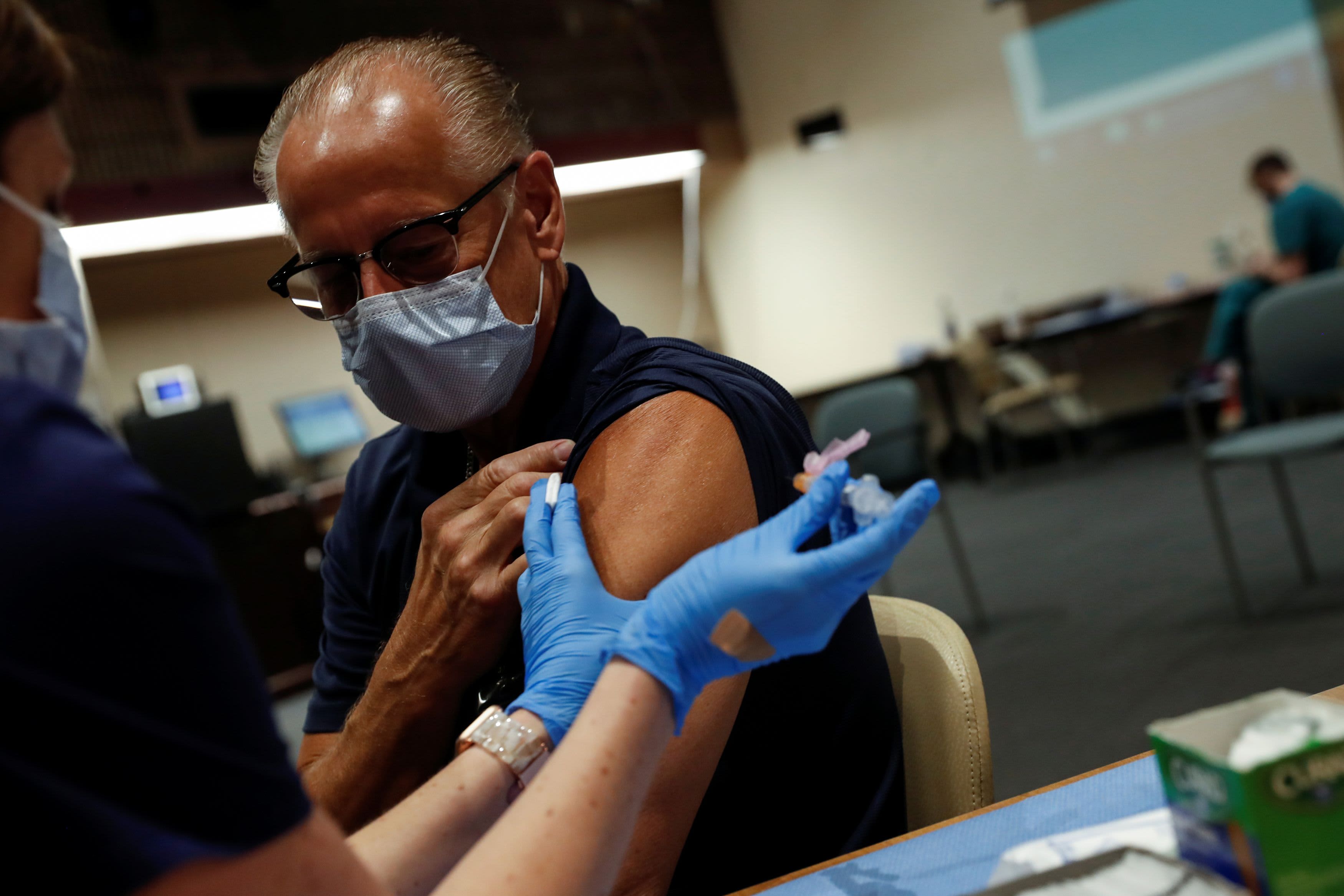Doctors in Chicago say that while there is still a lot of unknowns with the new omicron COVID variant, "what we do know is concerning." But exactly how worried should you be?
"All we know is really the basic science," said Dr. Emily Landon, infectious disease specialist and chief hospital epidemiologist at University of Chicago Medicine. "That means that we know the sequence of the virus and that means we can tell what the spike protein looks like compared to what the usual spike protein looks like. The mutations that are present in the spike protein are concerning. Some of them are the same ones that have made delta variant very, very transmissible. There are also additional changes in the spike protein that we're seeing in the beta variant and the lambda variant. Those are the two that we were concerned might be able to bypass immunity from the vaccine."
But according to Landon, "this is not an all or none."
"It's important to know that just because we see these changes and they're changes that we've registered before as being consistent with or going along with less vaccine immunity, sort of the vaccine being not quite as good or being more likely to transmit more quickly and more easily from person to person, does not necessarily mean that this particular virus is going to take over and be the most common variant when that's the case ," she said. "We just don't know yet."
Dr. Sharon Welbel, director of hospital epidemiology and infection control at Cook County Health, said experts in South Africa sounded the alarm quickly, which could lead to a better response
"The South African researchers got this information out very quickly to the world," Welbel said. "Now we have researchers all over the world investigating this."
Chicago is already bracing for the variant to be detected in the U.S. and in the city, though it remains unclear how quickly it could spread.
"When you put so many different variants or sort of changes into one virus, sometimes it doesn't work very well. And just because we're seeing some cases in South Africa does not necessarily mean that that virus is going to be fit enough or good enough to supersede or do better than delta," Landon said. "So far, delta has been the most effective variant of this virus and lambda, beta - the two others that seem to have been higher risk for vaccine escape - did not really. They can't really make a dent in delta because delta is so much faster, so much more effective... and so we don't know about omicron, whether or not it's gonna be able to take over well delta is already present."
In a statement Monday, Chicago Mayor Lori Lightfoot and Chicago Department of Public Health Commissioner Dr. Allison Arwady said the city is "very engaged in the heightened discussions regarding the omicron variant of the COVID-19 virus, particularly with our federal partners."
Feeling out of the loop? We'll catch you up on the Chicago news you need to know. Sign up for the weekly> Chicago Catch-Up newsletter.
"At this point, there are many questions which scientists across the world, and at the Chicago Department of Public Health, are actively working to address all while closely monitoring this strain," the statement read. "While that work continues, we must as a city, and importantly as individuals, continue to follow the public health guidance: get vaccinated, and if vaccinated, get your booster; wear a mask indoors and when you're around other people; and if you are feeling sick, stay home to save lives. The unvaccinated remain the most at risk to themselves and others so please get vaccinated as soon as possible."
Similarly, Cook County's health department said on Friday it was watching the variant "very carefully."
"We don't know if the variant has reached the United States, but given the global concern about the virus, it is more important than ever to continue to follow public health recommendations: Mask Up, Wash Your Hands, Stay Physically Distant, and most importantly, get vaccinated and get your booster as soon as you are eligible," said Dr. Rachel Rubin, co-lead and senior medical officer for the Cook County Department of Public Health. "The longer people do not get vaccinated, the risk of deadlier variants increases."
The global risk of omicron is "very high," the World Health Organization said Monday, as more countries reported cases of the variant that has led to worldwide concern that there is more pandemic suffering ahead.
Despite the global alarm, there is still little understanding about the variant and how virulent it may be.
The World Health Organization announced last week that omircon has been classified as a "variant of concern."
WHO Health Emergencies Programme COVID-19 Technical Lead Dr. Maria Van Kerkhove said early evidence on omicron, known by the technical term B.1.1.529, shows that the variant has a large number of mutations, some of which have concerning characteristics.
Omicron has also shown to have an increased risk of reinfection compared to other highly transmissible variants, indicating that people who contracted COVID and recovered could be more subject to catching it again with this variant.
The leading infectious disease expert for the U.S., Dr. Anthony Fauci, added that public health experts are trying to find answers to questions such as whether the omicron variant causes more severe illness and whether it can evade protection from vaccines or treatments.
Symptoms connected to the new variant have been described as "extremely mild" by the doctor who first raised concerns over the new strain. Dr. Angelique Coetzee, chair of the South African Medical Association, told the BBC Sunday that she started to see patients earlier this month presenting with "unusual symptoms" that differed slightly from those associated with the delta variant.
"It actually started with a male patient who's around the age of 33 ... and he said to me that he's just [been] extremely tired for the past few days and he's got these body aches and pains with a bit of a headache," she told the BBC.
The patient didn't have a sore throat, she said, but more of a "scratchy throat" but no cough or loss of taste or smell — symptoms that have been associated with previous strains of the coronavirus.
"The trick is you're not going to be able to tell the difference between omicron, delta lambda, plain COVID from the beginning," Landon said. "Influenza or even common rhinovirus causes most of our common colds in the winter. You're not going to know the difference between those if you just look at your symptoms. For many people, those symptoms are overlapping. And while there are some parts of the Venn diagram like taste, loss of taste and smell, or common COVID than these other things, there's a lot of overlap. You're just not going to know especially at the beginning of an illness, what kind of illness you have. You have to get tested."
But getting tested won't necessarily tell you if you have the omicron variant, Landon said.
"When you get a COVID test they're just looking for whether or not you have COVID," she said. "They're not on which kind of in order to figure out the exact strain of COVID. You have to do this thing called sequencing, which takes a lot longer. It's much more intensive. You certainly can't get that back in 24 hours, and it's only done by specialized labs."
The extent of the actual spread of the omicron variant around the world, however, still remains unclear as countries discover new cases each day.
Scientists in several places — from Hong Kong to Europe to North America — have confirmed its presence.
Canada’s health minister says the country's first two cases of omicron were found in Ontario after two individuals who had recently traveled from Nigeria tested positive.
The U.S. has yet to identify any cases but Fauci and other experts have warned that it could already have made it to America.
Chicago officials say while it may not be in the city yet, it likely will be detected.
“We don't have any reason to believe at this moment that omicron is here, but given the way in which this virus and variants spread, I think we have to assume that it will get here at some point," Lightfoot said. "We still are seeing overwhelmingly that the variant that is here in Chicago remains the Delta variant, but we have to take heed of what we're seeing across the world.”
Moderna's Chief Medical Officer Paul Burton said Sunday the vaccine maker could roll out a reformulated vaccine against the omicron coronavirus variant early next year.
The vaccine maker "mobilized hundreds" of workers starting early Thursday morning, on Thanksgiving, to start studying the new variant, the company said in a statement.
Current vaccines could provide some protection, depending on how long ago a person was injected, Burton said. Still, he said unvaccinated people should get vaccinated or receive their booster shots, if eligible.
It's not clear whether new formulations will be needed, or if current COVID vaccinations will provide protection against the new variant.
"We had the same concern with the delta variant," Welbel said. "And again, the pharmaceutical companies - at least Moderna and Pfizer - were thinking that they may have to reformulate their vaccine, but as it turned out that with boosters they seem to work pretty well. Again, and when we're talking about working, what I'm saying is they're working well in preventing severe disease and death. And so it might be that that will also be the case with [omicron]. I think in the meantime, we really have to function somewhat at a level prior to having vaccines available, which isn't hard. It's what we're already doing now. We need to mask when we're indoors, we need to maintain physical distance one we're able to, we need to test and do surveillance."
According to Landon, there isn't cause for panic yet.
"I think a cause for concern, not a cause for panic," she said. "There's a lot to still learn and I am personally not convinced that this is going to be some sort of doomsday variant. Obviously there could be new information that might change my mind about that."



